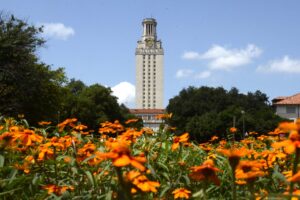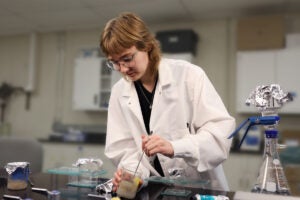AUSTIN, Texas—As a graduate of one of the five health magnet high schools in Texas, incoming UT Austin freshman Tessa Avila seems well prepared for the academic challenges she will face as a student in the School of Nursing.
Avila has been working toward a career in the health field from the time she enrolled at El Paso’s Silva Magnet High School for Health Care Professionals, acquiring basic first-aid and life-saving skills that are at the heart of the nursing profession. “I’ve learned the anatomy and physiology of the body, medical terminology and skills such as CPR and the Heimlich Maneuver,” she said. “During the summer months, I would volunteer at a local hospital, working in the outpatient pharmacy and laboratory. These were great experiences that got my foot in the door.” Her eventual goal is to acquire a master’s degree, become a registered nurse and work in a hospital emergency room.
Still, after graduating with a senior class of 142 students, Avila conceded that being part of UT Austin’s student body of more than 48,000 is a bit intimidating. Thus, she is an eager participant in the University’s GONE TO TEXAS ’99 program. The event on the South Mall of campus at 8 p.m. Aug. 24 offers new students a Texas-size welcome to UT by President Larry R. Faulkner, deans, professors and returning student leaders on the night before fall classes begin.
“I want to go to GTT so I can sort of sample everything at once,” Avila said. “I will get a better understanding of the population and make new friends.”
Avila is the first member of her family to attend UT Austin. She chose the school because of its academic reputation and its central location. “It’s about eight hours away from my parents and only about three hours away from my aunt and uncle,” she said. “But, I also chose UT because of what I’ve heard about the campus. It is academically challenging and also provides great resources.”
UT Austin’s nationally ranked School of Nursing has programs at the bachelor’s, master’s and Ph.D. levels; excellent, in-depth clinical programs; and 14 faculty members who are fellows of the American Academy of Nursing. But, with less than 1,000 students, the School of Nursing is small and intimate, which helps students from smaller schools and towns make a comfortable transition to university life.
“I’m excited to be starting something completely new to me,” Avila said. “I need to learn how to handle all of the sudden freedom I’m going to get. It’s a challenge to learn how to balance fun with academics. With all the freedom that college life offers, I want to explore what my limits are.”
Avila demonstrated the discipline needed to succeed in college often during her high school years.
“I had a math course that was crippling my grade point average,” she said. “Yet, I never dropped it. I never quit. Instead, I stuck with it for the rest of the year and squeaked by with a B.”
She placed fourth in the nation at a 1999 Health Occupations Students of America National Leadership Conference competition, after winning the regional and state contests. “I’ve always loved medicine, and I want to help people in their time of need,” Avila said. “I’ve learned that if you have a goal in mind and apply yourself with everything you have, you will not fail.”



